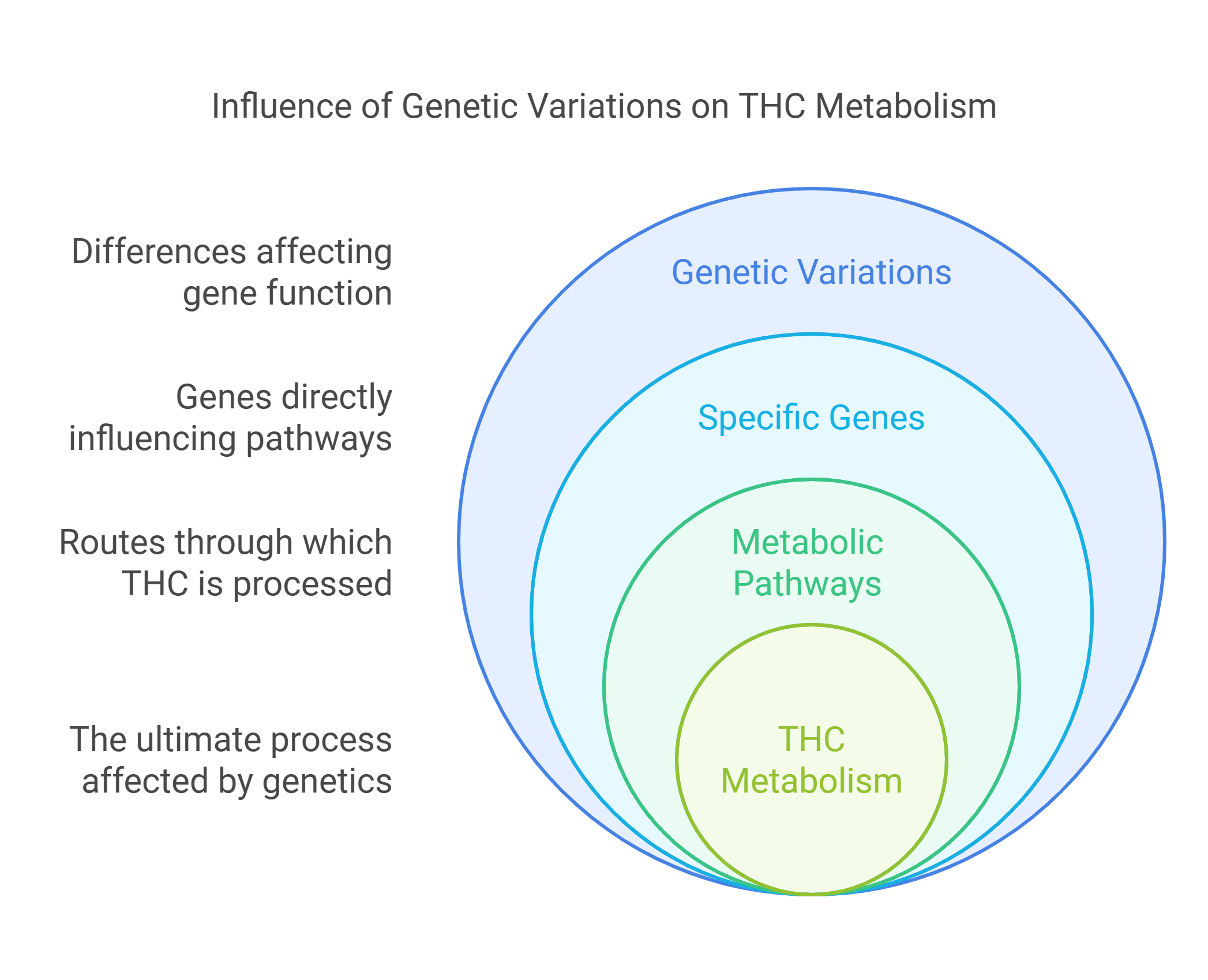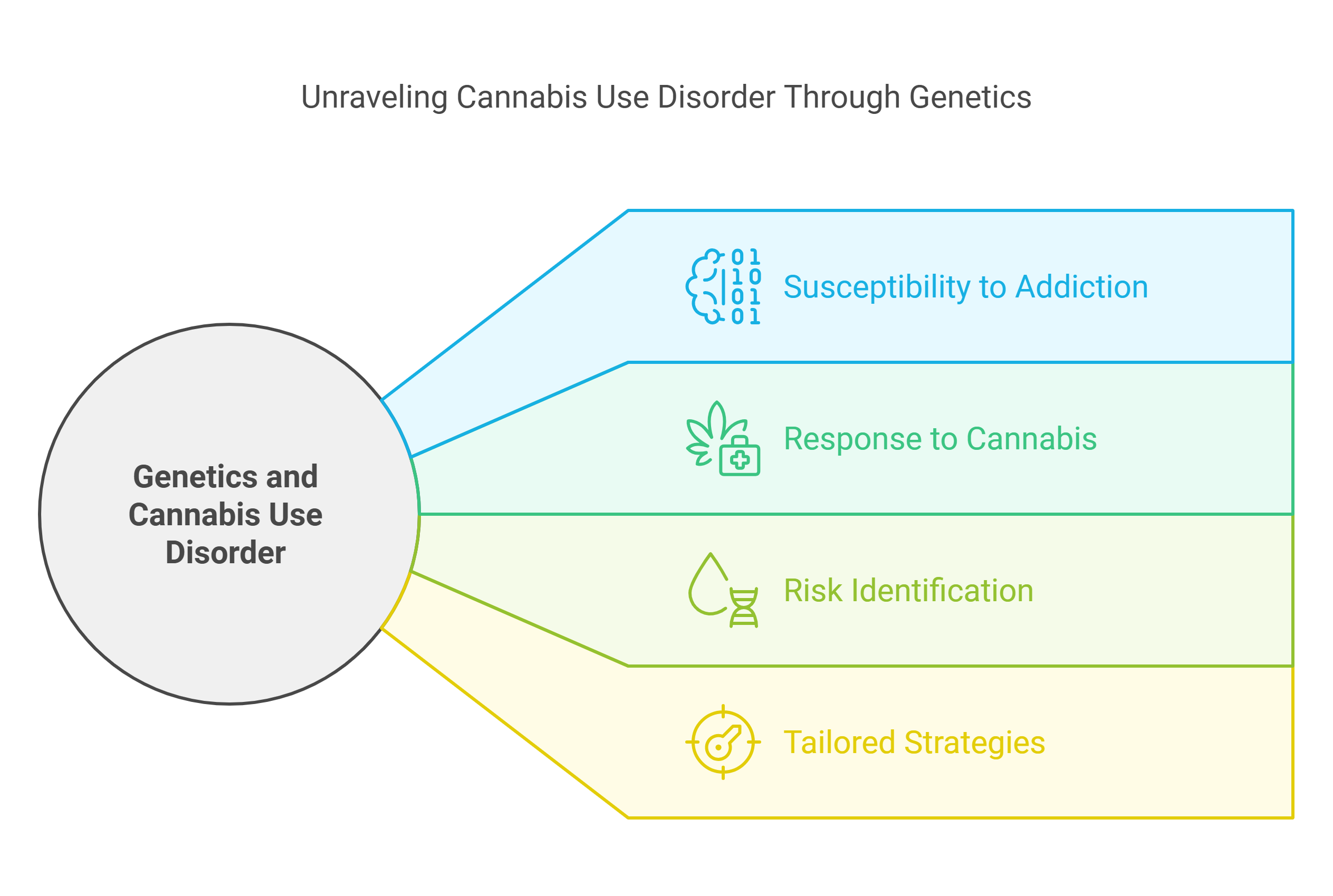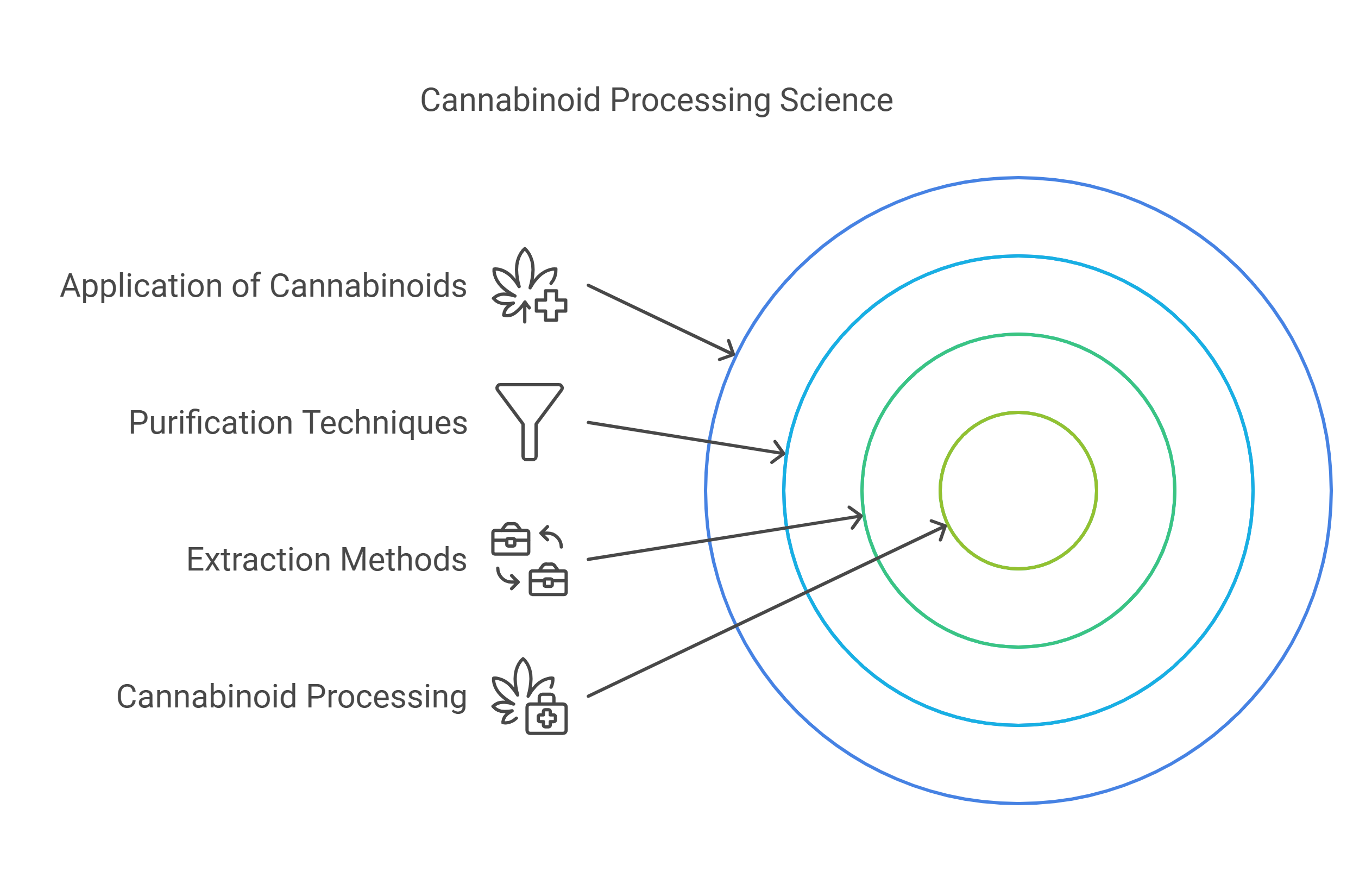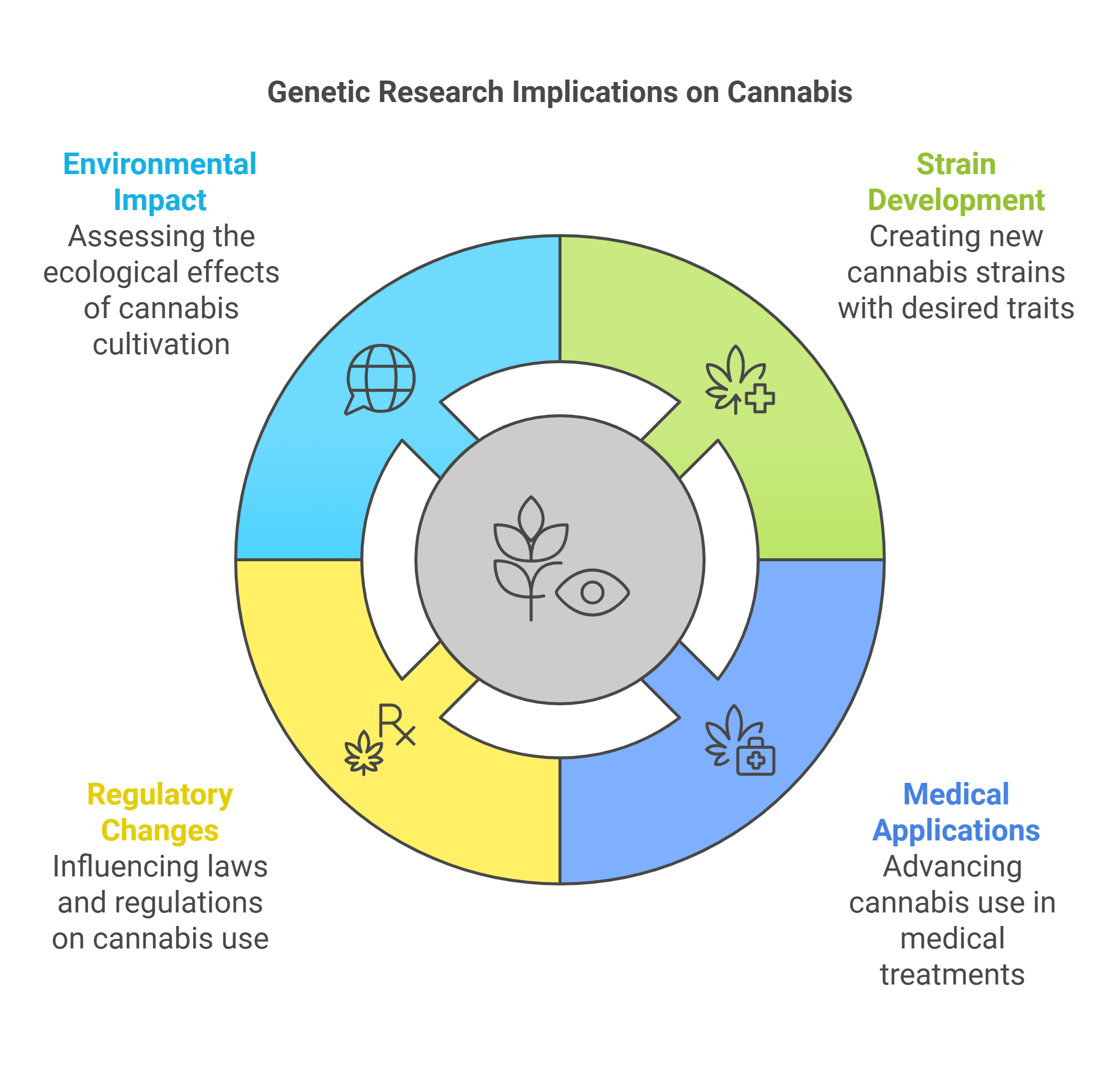Our bodies function differently when processing cannabinoids like THC because of varying genetics at times. A difference in our body's processing and breakdown of the THC could mean that we become more sensitive to cannabis. Understanding these genetic variations is important, especially for the young, who are at higher risk for cannabis use disorder. This article explores how genetics work in relation to these processes and what it means for those consuming cannabis.
How Do Genetic Variations Influence THC Metabolism?

Who would believe that the reason you might feel a lot stronger effects of marijuana than someone else, even though you all smoke the same, is because of genetics? It's because it varies in the metabolism of THC, which is the active substance in weed that causes effects. So let's look into how this works.
How Genes Affect THC Breakdown
The overall genetic makeup of a person also determines how the body will break down THC. Every individual has certain variants that better digest THC at a faster or slower pace than an average individual. Here is the scoop:
- Fast Metabolizers: Someone may take in bigger doses of cannabis for the same effect because this substance is metabolized in their body very quickly.
- Slow Metabolizers: Have longer and stronger effects because THC stays longer in their body system.
- Normal Metabolizers: They lie somewhere in the middle.
This genetic variation means two people can smoke the same joint and have totally different experiences.
Common Gene Variants and Their Impact
A few common gene variants influence how THC is metabolized. Genetic differences in these genes will affect how you might feel after smoking:
- CYP2C9: A gene affecting the breakdown rate of THC. Different variants could cause slower metabolism.
- CYP3A4: Another gene involved in processing THC, with variants impacting the metabolism speed.
- UGT1A1: This gene is linked to the last steps of THC metabolism; some variants slow down this process.
Knowing your genetic variants will help you understand how your body reacts to cannabis.
Why Some People Feel Higher Than Others
Ever shared a joint with friends and wondered why you felt way more stoned than anybody else? It could be down to your genetic expression. These differences in genetics mean
- Some people are just more sensitive to THC.
- Others may require a higher dose to achieve the same effect.
- Your even genetic makeup can influence the side effects you feel.
And with this knowledge of genetic differences, you can make the best decisions regarding using cannabis. It is not the amount smoked but how you react to it.
The next time you light up, remind yourself that the reason you feel so relaxed or why your friend is so lovingly on cloud nine when you just feel mellow might be because of your genes.
How Does Genetics Impact Cannabis Use Disorder?

Do you ever ask why some people can smoke weed and be fine, while others don't make it? It is said that much of it lies in your genetic composition. Your DNA plays the biggest role in how to handle cannabis. It's way beyond mere personal choice and the number of times a guy lights up; it lies in what he carries genetically too.
Genetic Predisposition to CUD
Some people just happen to be more prone to the dependency on cannabis, simply because of their inherent genetic makeup. If you have substance use disorder running in the family history, it may increase your vulnerability as well. This is how the genetic predisposition to cannabinoids works:
- Genetic Risk: Certain genes can increase your chances of developing CUD.
- Positive Genetic Correlations: These are interrelations between your genes and what makes you more likely to become dependent on cannabis.
- Genetic liability refers to the existence of certain genetic factors known to increase susceptibility to cannabis use disorder.
Therefore, if you or someone near you is suffering from CUD, then it is by no means only a matter of choice, sometimes even strongly predisposed within your genes.
Sex Differences in Cannabis Metabolism
Did you know that the same effects might be different in men and women? Yep, it's true! Such differences could stem from genetic and environmental influences.
- Females: Women may metabolize THC at a slower rate, hence are prone to CUD.
- Males: Some reports even indicate that males are affected more in the short run, as they become drowsy or inattentive.
- Comparison: Although CUD can develop in both sexes, the path that they take to getting there may vary because of these genetic influences.
Underlying these differences, knowledge will help allow tailoring treatments and advice for cannabis users.
Potential Treatments Targeting Genetic Factors
Imagine how we could treat CUD much more effectively with our understanding of genetics. Here's where the future is taking us! Researchers are studying how genetic factors may be used to guide treatment.
- Genome-Wide Association Studies: These studies help identify specific genes linked to CUD.
- Targeted Medications: Thereby, upon identifying genetic associations, new medications can be developed to effectively intervene with cannabis dependence.
- Tailor-made treatment plans: Treatment provided to patients based on genetic aspects may help them recover effectively.
"We are just scratching the surface of how genetics influences marijuana addiction, but the future promises much more targeted and effective treatments."
So the next time you hear people saying cannabis affliction, just remember, it is not all a question of willpower. A lot of genetics plays into the story.
What Is the Science Behind Cannabinoid Processing?

Ever wondered why cannabis hits you differently than your friend? It's all about the science of how our bodies digest cannabinoids.
The Role of Enzymes in Cannabinoid Metabolism
These little helpers in the body break down materials. If these were not there, cannabinoids would be sitting around in your system for far too long.
- Enzymes catalyze the degradation of THC, the active compound responsible for the high.
- Others have varying amounts of enzymes, which determines the metabolism.
- Some may seem to feel higher longer because their enzymes work slower.
Research Studies on Genetic Differences
Scientists have also been delving into how genes influence the way we metabolize cannabinoids. It turns out your genes may explain why you get the munchies while your buddy gets sleepy.
- Studies show that genetic differences among individuals cause variations in cannabis experiences.
- Some genes predispose you to more positive feelings with cannabis, while others predispose you to anxiety.
- Scientists have not discovered precisely how these genes respond to other drugs.
Future Directions in Cannabinoid Research
This world of cannabinoid research is like a box of chocolates—full of surprises. Some investigation is being done about how the interaction between our genes and environment shapes cannabis initiation and use.
- New studies are concentrated on the way genetics can predict cannabis use.
- A movement seeks to know how marijuana works together with other drugs.
- Future research can lead towards tailoring individualized cannabis treatments.
The future of cannabis research is understanding how we, as individuals, process this plant. It is not about getting high; it is about knowing what has happened inside our bodies.
What Are the Practical Implications of Genetic Research on Cannabis?

So, how do you reach the teen stage for that message about the genetic risks of cannabis? It's educational, my friend. Schools and communities are supposed to come up with programs to break science down in a way that's understandable to young folks. Teens are not getting any genetic tests every day to understand the risks without their help. You need to talk about having genes that make people process THC differently and hence change their experience with cannabis.
- Emphasize how genetics could help determine cannabis effects.
- Discuss possible risk factors for cannabis use disorder (CUD).
- Highlight the need for early educational learning.
Ever wonder if your genes could tell you how to handle cannabis? Genome-wide association studies are opening that up. Just imagine having a personalized guide for how cannabis might work in you. Here's a working of how an international cannabis consortium is piecing together how these kinds of different gene variants may affect your high, almost like a cheat sheet for your cannabis experience.
- Customized exposure to cannabis based on genetic constitution.
- Use genome-wide studies to predict cannabis interactions.
- Benefit from personalized cannabis advice.
It's genetics; what's the problem with the regulation of cannabis? Breakthrough. The science of understanding genetic differences is showing integrative psychiatric research, which can mold smarter policies on cannabis. Knowing who is at risk for CUD will better enable public health strategies targeting these groups. Everyone gets to have their fun while staying safe.
- Policies Based on Genetic Discovery.
- By targeted regulations, target at-risk groups.
- Use genetic knowledge to improve the public health outcomes.
Understanding your genetics can direct you toward more enlightened decisions and safer exposure. It's high time you let yourself get a little geeky about your genes.
Understanding Human Genetic Predisposition to Cannabinoids and Effects
Genetics are the biggest players in terms of how our bodies will react to the cannabis. Some people metabolize THC—the active ingredient of cannabis, which causes a high at higher rates than others do. This may be something that would change how they feel after use. For example, around 25% of people carry genes that slow down the metabolism of THC to an extent that it causes a stronger and longer-lasting effect. This is a pretty important thing, especially in young adults whose brains are not fully developed and may not fully realize the implications. The higher the acceptance of and accessibility to cannabis, the more valuable knowing the difference makes. More or less, understanding the role of our genes in our experience of cannabis is what leads to wiser choices and safer use.


